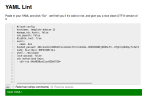@Programster Your experience with virt-install could be translated as:
Two people having a conversation about a problem they are having with a Ferrari and special custom module, and you joined saying that your car is also not working, except your built both the car and module out of parts in your garage.
Just to highlight a few actual technical issues with your situation:
- You do not show how you build the ISO. In PVE this process is automated and completely masked from user. In your case - its critical that this is done properly.
- You mention "cloud-init.cfg" file, but thats an incorrect naming for a properly built ISO. The only valid files are: user-data, meta-data, vendor-data, network-data). Its critical that they are properly formatted and located in correct place on ISO.
- Unless you lost formating due to forum copy/paste - your YAML is incorrect. The easiest way to illustrate it - is to plug your yaml here:
https://onlineyamltools.com/convert-yaml-to-json
A somewhat correct format should be:
Code:
---
hostname: template-debian-12
manage_etc_hosts: false
ssh_pwauth: false
disable_root: true
users:
- name: kim
hashed_passwd: $6$rounds=4096$thisIsASaltStrin$3o4L.8EKhHkNHEjD89SLF3..OfgVrqJ02Kp/7zZetSR/jDQzkyuwJ7RzB4Km9hYjTICak9RAUMo0/3PENZFwM0
sudo: ALL=(ALL) NOPASSWD:ALL
shell: /bin/bash
lock-passwd: false
ssh_authorized_keys:
- ssh-rsa AAAAB3NzaC1ycREDACTED=
Finally, if you are set on creating things manually - later versions of virt-install include a special option that lets you specify files directly:
Code:
--cloud-init
Pass cloud-init metadata to the VM. A cloud-init NoCloud ISO file is generated, and
attached to the VM as a CDROM device. The device is only attached for the first boot. This
option is particularly useful for distro cloud images, which have locked login accounts by
default; --cloud-init provides the means to initialize those login accounts, like setting
a root password.
Good luck
Blockbridge : Ultra low latency all-NVME shared storage for Proxmox - https://www.blockbridge.com/proxmox


